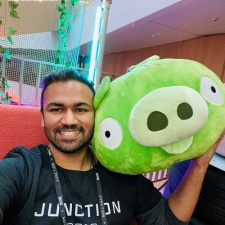For decades, no matter the industry, people of colour have suffered through a lack of opportunity and a lack of respect, leaving them stuck playing second fiddle throughout their careers.
The games industry is no different, and here at PocketGamer.biz we wanted to do our part and help bring attention to the many incredible people of colour that help make up this sector. That is why we are committing to a new long-term regular feature to spotlight these people and their careers.
So, welcome to our ‘POC in Mobile‘ series, where discussion about finding a place in the games industry, the various challenges faced as a minority, and what truly needs to be done to make games more diverse will be the focal points of conversations.
This week, we spoke to Rovio senior game designer Harshal Karvande about his experience in games and why it’s up to individual people to help push diversity.
PocketGamer.biz: Can you start off by telling us about your role in games and what it entails?
Harshal Karvande: I’m a game design lead at Rovio working on Small Town Murders, which is a murder mystery solving puzzle game. As a lead of a project and the game design craft, my responsibilities range from owning the creative decisions on a game to ensuring the career development and individual well-being of the designers in the studio.
Focusing on expertise in one domain while being sensitive and interacting with associated areas makes you an all-round craftsman.
Harshal Karvande
Why did you want to work in the games industry?
Looking back, the strongest memory I have of when I first thought about working in the games industry, was having just finished Final Fantasy VII and sitting in awe as the credits rolled. I was about 12 and this game where a band of misfits from various walks of life come together to save the world instilled a powerful world view in me. I dreamt of being one of the names in the credits, to someday be part of games that trigger something as powerful in others.
How would you recommend people get started in games? Any tools or literature you would advise?
Having a decade of professional experience making games, it is humbling to find there aren’t any boundaries that can contain what we term as game design. But for getting started in game design, I advise people to locate their interest: is it systems and the dynamics they create that appeals to you, or the fiction and thematic content that draws your interest? Is it the mechanics that drive the gameplay, or the tuning that holds the economy in balance?
Focusing on expertise in one domain while being sensitive and interacting with associated areas makes you an all-round craftsman.
What did you study (if anything) for your role? Are there any courses out there that you would advise for aspiring professionals?
I have a Bachelor’s Degree in Computer Engineering which I pursued specifically to work in digital games. My love and prowess for math, logic, probability and object-oriented approach to programming is something that helps me deconstruct systems of play even today.
After that, I was lucky enough to get a seat at the National Institute of Design for a Master’s Degree in New Media Design, which set me on the path of design thinking and its application in games and play. I would advise aspiring designers to ground themselves in fundamentals as per their interest – most courses and institutes around the world can then nurture the thinking, making, feeling and expressing required in becoming a designer.
What do you think should be done to improve diversity, not only across the games industry, but across all industries?
To make games, to write songs, storytelling or cooking – any act of creating requires considerable care. Care is what resonates with others. It matters to them because you cared. To improve diversity across all industries I implore each and every individual to care. To care will spark in you a thorough commitment to well-being and acceptance of the wholeness of others. To care is to cultivate character.
What do you think can be done to help encourage more people of colour to get into games?
Sometimes working in diverse teams where all parts of a project are co-constructed, it’s challenging to acknowledge an individual’s contribution with clarity – making it difficult for the discourse to emerge for and in support of people of colour to get into games.
I would advise all of us in the industry to take findings like ‘blind auditions that eliminate gender bias’ to the extreme.
Harshal Karvande
What encouraged me at the start and now to write this piece is a very small part of that – visibility to spark the conversation that you should get into games because people of colour are already (and always have been) making games, every moment, every day.
Is there anything that recruiters should be doing differently to address the lack of diversity across not only games development but all industries?
I think the role of social media (including but not limited to LinkedIn, Twitter, Instagram,
Facebook etcetera.) can have an extreme, biased, non-conscious effect on recruitment. Awareness of bias is a lifelong exercise, let alone acknowledging and acting on it.
I would advise all of us in the industry to take findings like ‘blind auditions that eliminate gender bias’ to the extreme. This could involve actively redacting names, pictures, and all social media information on applications especially in the early processes of identifying, attracting, screening and shortlisting suitable candidates.
Since the surge in the #BlackLivesMatters campaign that took place last year, what changes (if any) have you seen from across the industry to address the issue?
I see an increased sensitivity in general across the industry for anything that requires care and consideration of all types of people. I strongly believe and live in the hope of these thoughts and ideas permeating into interactions in everyday life.

